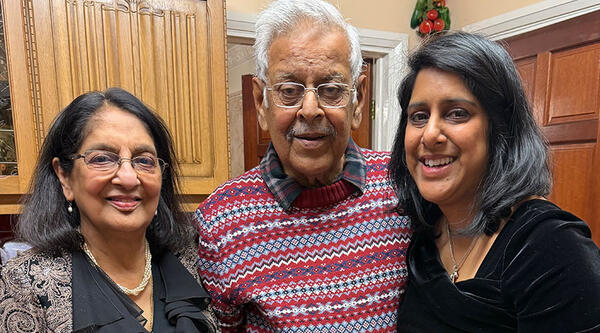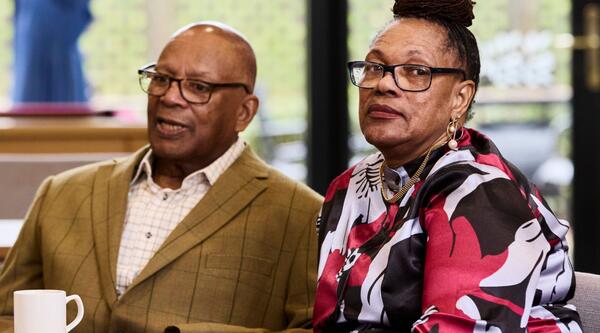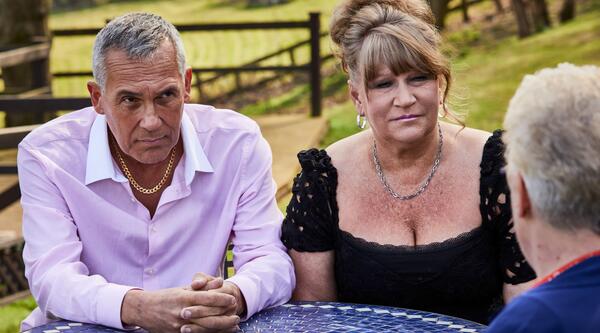Supporting the person with dementia to grieve
If a person with dementia is grieving, it’s important to support them. Read our tips on helping them grieve, as well as advice if they're asking for the person who has died.
A person with dementia may grieve a recent death. It may help the person to be involved in conversations and arrangements after the death (such as the funeral). This can help them take in the loss and start the grieving process.
If someone starts to behave differently and this is challenging (for example, if they are becoming agitated, aggressive or trailing – where they follow their carer round), it could be a direct reaction to the bereavement. It may also be a sign of distress because they are not being supported to grieve.
It can help to try and see if there are things that trigger their grief, such as a photo or an activity that they associate with the person who died. Identifying these may help you support the person to grieve, or help them find a way to avoid these triggers.
Tips for supporting the person to grieve
- Acknowledge the person’s feelings and encourage them to express themselves.
- Reminiscence work can be helpful after a bereavement. You can speak to a professional such as a dementia support worker or dementia specialist nurse for more information on using reminiscence. If the person lives in a care home you can speak to staff about this.
- Allow them to talk or communicate in other ways about the person who has died. For example, they might want to listen to music they used to enjoy with that person or look through photos.
- Giving the person something that reminds them of the person who died may help them to feel more connected. This is another way of supporting them using reminiscence.
- Art or music can support people to express their feelings and grief.
- They may find comfort in their spiritual beliefs or faith practices such as prayer or meditation. Support them to find the right time and way to express these beliefs if they wish to.
If the person’s main carer dies, as well as feelings of grief and loss for the person, it can also lead to lots of change in the person’s life. They are likely to need lots of support, guidance and assistance to adjust to these changes.
If the person is in the later stages of dementia and remembers a bereavement they’ve had in the past, they may not be able to talk about it. Instead it may show in their mood or behaviour (for example, they may be crying a lot more or be more agitated). This may explain changes in their mood or behaviour that don’t otherwise seem to have an obvious cause.
Asking for the person who has died
A person with dementia may forget that someone has died. They may ask about them often, come up with reasons for their absence (such as being away or having left them), or report them as missing. This can be very difficult the person with dementia as well as any family and friends coming to terms with the death. If they are told again that the person has died, it may be like hearing it for the first time. How you handle this situation will depend on the circumstances, but most importantly on the person and what is in their best interests.
Tips for reminding a person with dementia of a death
- For some people, a gentle reminder that the person has died may help. For others this will be very upsetting.
- Reminding them about the funeral in a sensitive and supportive way, such as looking through the order of service with them, may help them to understand. Personal possessions may also help.
- Recognising and focusing on how the person is feeling at the time can make knowing what to say easier.
- If the person is in the later stages of dementia, trying to remind them that the person has died is unlikely to work and may be very distressing.
- If someone is becoming very upset it may be best not to try and remind them.
- Support the person through changes in their feelings and behaviour. Reminiscence and other creative techniques (such as art or music) can
- be helpful for this.
- Look for aspects of the person’s behaviour that give clues to how they are feeling. For example, at 5pm they always had a cup of tea together and this is when they seem to ask about the person who has died.
- If there is a pattern you may be able to use techniques to help. For example, at that time you could ask the person about hobbies they used to do together to encourage positive reminiscence (try to remind them of these hobbies if you need to).
- Be patient and aware that adjusting to the loss will take time. Respond to whatever the person is communicating.
If responding to the emotion or reminiscence doesn’t work, you could try distracting the person. However, while this may help them to be less distressed in the moment, it may not help the grief process in the long term.
Past bereavements
A person with dementia may forget about a past bereavement, and hear of it as if for the first time. It can feel as though it’s just happened, and they may feel the emotions all over again. They may struggle to process the information that the person died a long time ago, and be left with the feeling of a recent bereavement. They may also confuse a recent bereavement with a previous one (for example, confusing losing their husband with losing their father).
Supporting a person with dementia who is bereaved can bring many challenges. However, there are things you can do to help the person feel safe and supported, such as talking to them about the person who has died and letting them know you are there for them. Also remember to acknowledge and take care of your own needs and feelings of grief during loss and bereavement.








